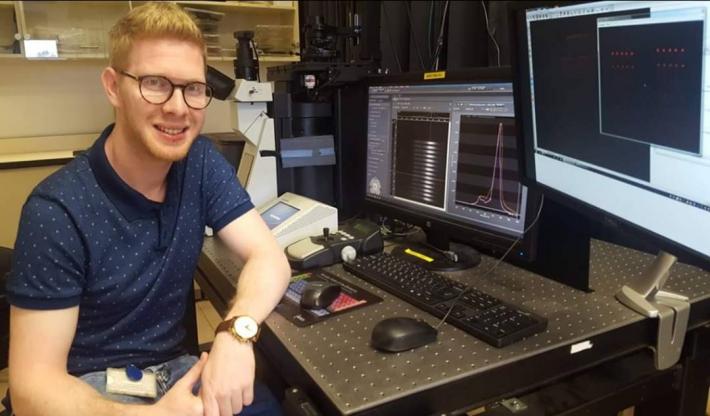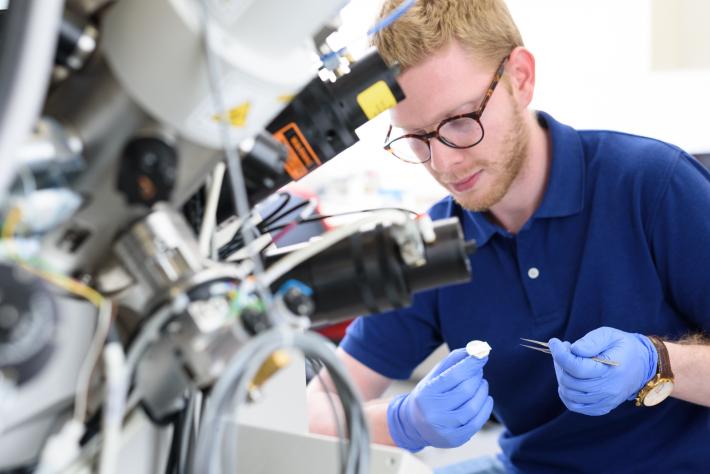He’s an Ultrasensitive Guy
Elad Segal has recently concluded his Ph.D. research at Prof. Adi Salomon’s lab, fabricating sensitive plasmonic detectors of toxic pesticides in liquids. Now he is busy establishing a start-up company, with the goal of helping humanity counter the challenge of airborne pollutants to which we are exposed
Global warming, urbanization, and the ever-increasing use of highly toxic pesticides that penetrate our soil, air and water sources,  expose us to hazardous materials, even if we live tens of miles from agriculture areas. Chronic exposure increases the risk of serious illnesses such as aggressive forms of cancer, asthma, Parkinson's' and Alzheimer's. With this issue on the rise, epidemiologists and toxicologists all over the world are concerned with its implications, and the demand for optimized toxicity detectors is increasing.
expose us to hazardous materials, even if we live tens of miles from agriculture areas. Chronic exposure increases the risk of serious illnesses such as aggressive forms of cancer, asthma, Parkinson's' and Alzheimer's. With this issue on the rise, epidemiologists and toxicologists all over the world are concerned with its implications, and the demand for optimized toxicity detectors is increasing.
Elad Segal, a Ph.D. student at Prof. Adi Salomon’s lab of the Bar-Ilan University's Department of Chemistry and BINA, has fabricated an optical sensor which can detect such pesticides, in liquids. The sensor's incredible sensitivity produces detection results one lever higher than required by The World Health Organization and The American Environment Protection Agency. The research, carried out in collaboration with Dr . Emir Haleva of Toga Networks, has recently been published in ACS Applied Nano Materials.
. Emir Haleva of Toga Networks, has recently been published in ACS Applied Nano Materials.
"The sensor is fabricated from a wafer-thin layer of glass that we cover with equally thin layers of metals, in a process called Sputtering” explains Elad. "We use nanometric layers of aluminum or silver, thin enough to generate plasmonic reactions but thick enough to prevent light penetration through the metallic surface slots. At first, the metal surface looks like arid desert land, and the light passes through its cracks. To prevent it, we shoot positive charged ions into the layer, seemingly ruining it, but actually creating carefully shaped and oriented holes that form an area for light trapping, but also for molecule depositing. When lit, this unique surface confines the strong electromagnetic field to a small, flat area. This electromagnetic area enhances the optic signal and forms an optic signature, a fingerprint if you will, of the suspected pesticide. At a ~106 enhancement factor, our ultrasensitive sensor enables us to detect trace amounts of harmful substances in liquids," says Elad.
The fabrication of this ultrasensitive sensor relies on more than five years of basic research, during which Elad conducted intricate chemical, physical and optical material characterizations. The future goal is to develop a low-cost and easily operated general device or even a smartphone application, that will enable anyone to check our food or water, and within moments know if it is safe to consume.
"Five to ten years from now, such application could be on the market," estimates Elad, "but many machine learning processes are needed  for automatic systems to be able to quickly and effectively detect pollutants in water or other liquids, and in more challenging environments such as apple peel or a banana. The pollutant signature varies from one environment to the next, so a myriad of measurements and analyses must be performed. If we compare the analysis abilities of an expert pathologist to those of an intern, the expert, who has seen thousands of patients and samples will quickly and with great certainty detect the kind of lesion in the selected sample. Analogously, we should conduct enough analyses so the automatic system will have broad enough data to base its detection on."
for automatic systems to be able to quickly and effectively detect pollutants in water or other liquids, and in more challenging environments such as apple peel or a banana. The pollutant signature varies from one environment to the next, so a myriad of measurements and analyses must be performed. If we compare the analysis abilities of an expert pathologist to those of an intern, the expert, who has seen thousands of patients and samples will quickly and with great certainty detect the kind of lesion in the selected sample. Analogously, we should conduct enough analyses so the automatic system will have broad enough data to base its detection on."
Elad's strong passion for a healthier, greener environment, paired with his understanding that the combination of science and technology can profoundly influence humanity, led him to participate in Bar-Ilan University's unique acceleration program – UNBOX. UNBOX transformed Elad from scientist to entrepreneur. Elad partnered with Dr. Ran Shauli of Bar-Ilan University's Faculty of Humanities and together established a start-up company aiming to develop unique sensors for detecting airborne pollutants. "We believe that the knowledge our sensors will provide would have a far-reaching impact on the field, on regulation standards, risks assessment, and most importantly, will provide a means for protecting human health," concludes Elad.
Last Updated Date : 20/04/2021



